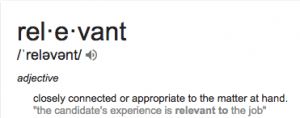Put relevant information on your resume, and you’ll have a chance at getting hired. Ignore this point, and you’re wasting your time.
Too often job seekers email copies of their resumes to anyone and everyone with no true, honest concern for how their skills, experiences and expertise compare to the job requirements. This is such a waste of energy and, in part, the reason so many people get frustrated applying for jobs.
If your resume does not show recruiters how your skills, experiences, expertise and accomplishments are relevant to their needs, there is no chance in the world you’ll get that job. You need to show RELEVANCE.
Don’t clutter up the internet and recruiters’ inboxes with useless resumes. I sometimes wonder if this is why video buffering has a special symbol that I see far too often. But seriously, everyone would be happier, even the candidates if resumes were relevant to the jobs being applied for.
The best resumes include information specific to the candidate’s skills and experiences and are relevant to the job they are applying for. At the very least, relevant resumes get a little more eye time from recruiters.
The worst resumes are the ones cluttered with lots of irrelevant information. These resumes are quickly ignored or tossed into the trash, despite the real potential of the candidate.
Here are 12 tips that can help your resume get that extra look and consideration by recruiters:
- Work harder to network and connect to people associated with the type of work and jobs you want. Your resume travels faster and more easily to the right people when you connect and talk before applying.
- Only apply for jobs that are clearly relevant to who you are and what you do, jobs that match your skills, expertise and career goals.
- Show this relevance clearly on your resume. Each previous job should show relevant skills and experiences to the next one you want.
- Remove the accomplishments and work history detail that are not relevant to the job you are applying for.
- Only list relevant education. If you don’t have a college education, you can list your high school, but nothing earlier.
- Your resume must be filled with positive phrases and succinct stories about relevant successes and accomplishments.
- Name your resume something informative, such as “Teddy Burriss Resume.doc”, not “MyResume.doc”.
- List relevant certifications, awards or honors. Leave the others off your resume.
- If a past position is not relevant to the job you are applying for, minimize the information you share about it.
- Don’t list your street address. The city and state are all that you need to share. Think identity theft and you have no idea where your resume ends up.
- Read your resume out loud while reviewing the job description. Do they match up? Really, do they? If not – STOP. Don’t send your resume or apply for this job. You won’t get this job.
- When you build your resume with relevant skills and experiences that show how you can help solve problems and increase productivity, you’re more likely to get an interview.
Bonus Tip – Review your resume and the job description again. If they match up well, send it off with a good cover letter. Good luck.
Put some thought into what your resume says and what you share when applying for your next great job. Always ask yourself, are my skills, experiences, expertise and talents relevant to the job I am applying for? Does my resume show this? It takes time and effort.
Relevance – It’s important in life and for your career transition.
If you want help with your career transition Journey consider a Quick Start Career Transition Coaching Program or a 90 Career Transition Coaching Program
Want help with your LinkedIn Profile – Hire me to help you Build a Professional LinkedIn Profile
Get the Free ebook – Building a Professional LinkedIn Profile
* This post was written by Career Confidential LinkedIn Expert Teddy Burriss of Burriss Consulting, Inc. Follow Teddy Burriss on LinkedIn, Twitter or Facebook to learn more about his Social Media Coaching and Career Transition services.

